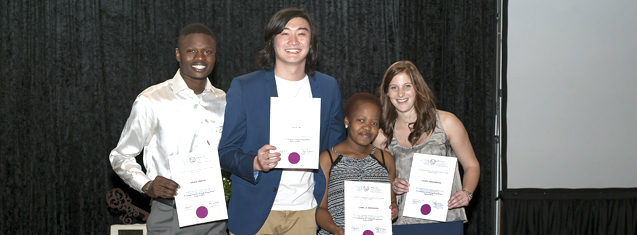Latest News Archive
Please select Category, Year, and then Month to display items
![]()
After South Africa’s battle with the record-breaking drought of 2015, Prof Andries Jordaan from our Disaster Management Training and Education Centre for Africa(DiMTEC) saw room for improvement in dealing with this kind of disaster.
Drought impact
Commercial farmers who are usually net exporters of food crops and communal farmers who own the bulk of the country’s livestock, were all hit hard in 2015. Most of the latter had no resources to spare as the drought progressed. The concern about the drought’s impact on the country’s food production and availability resulted in a joint goal of preventing food scarcity during future droughts.
Prof Jordaan’s visit to the National Drought Mitigation Center (NDMC) in Lincoln, Nebraska, in the US, several years ago prepared him to better equip communities in South Africa to deal with drought situations. “I recognised that in spite of the impact DiMTEC has been able to make on disaster preparedness, a gap remained in disaster response in South Africa.”
Sharing knowledge
In August this year Prof Jordaan again visited the NDMC. This time he requested a few key players in South Africa’s agriculture and disaster response communities to join him. With him were Janse Rabie, head of Natural Resources at AgriSA, a nonprofit organisation that functions as an interface between the government and about 28 000 South Africa farmers, and Moses Musiwale Khangale, director of Fire Services for the South African Ministry of Cooperative Governance and Traditional Affairs.
The South African delegation met with and learnt from climatologists, geospatial technologists, and outreach and planning analysts.
Leadership for Change celebrates graduation ceremony
2014-10-15

The Leadership for Change Programme hosted its third annual graduation ceremony on 9 October 2014 at the Centenary Complex on the Bloemfontein Campus.
The event consisted of two segments. The first was aimed at the group who has travelled abroad during the past year. They were presented with special certificates acknowledging the work they have done during their participation in the programme.
The second element of the evening was to wish the 2014/2015 group all of the best for their upcoming travels. This group will be travelling abroad during next year. Of the 250 applicants, the top 32 students were chosen to be part of the Leadership for Change Programme.
Prof Jonathan Jansen, Vice-Chancellor and Rector, said, “I hope you came back with the capacity to distinguish right from wrong – not only through law, but morally as a leader.”
Waldo Staude, Vice-president of the Student Representative Council (SRC), acted as Chair to the evening’s proceedings. He is also an alumnus of this programme.
“This programme has made its mark as we observe the number of leadership positions our students from the programme hold on this campus,” Staude said. “We have eight Leadership for Change students in the SRC for the 2014/15 term.”
The Leadership for Change Programme each year gives first-year students exposure to top universities throughout the world. Its focus is to establish a new campus culture of student relations across boundaries.
Six cohort groups – of between five to six students each – will visit universities on three different continents in January 2015. Each group will be accompanied by a UFS staff member serving the role of mentor.
The universities they will be visiting (according to continent), are:
USA
Cleveland State University
University of Minnesota
University of Vermont
Europe
The Netherlands: Vrije University in Amsterdam
Belgium: University of Antwerp and Ghent University
Asia
Japan: International Christian University